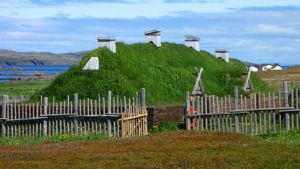News
Vikings may have been to North America much earlier than believed
This article is more than 9 years old.
Sensational archeological discovery in Canada could rewrite North American history

The Vikings at L’Anse aux Meadows may have had neighbours (photo: D Gordon Robertson)
Until now, the only known Viking settlement in North America was discovered 55 years ago.
But now a team of archeologists working in Newfoundland, Canada, may have hit upon a discovery that will turn conventional Viking wisdom upside down.
The Icelandic Sagas have long held that Vikings made it to American shores at least 500 years before Columbus ‘discovered’ America, but it has always been a challenge to separate fact from fiction in the stories written by the island’s monks in the 13th and 14th centuries.
In the 1960s, archaeologists determined that L’Anse aux Meadows, a site on the northernmost tip of Newfoundland in Canada, was a Viking camp established sometime in the late 10th or early 11th century.
First seen from above
But now Sarah Parcak, a leading archaeologist, has unearthed evidence of a possible second Viking site in North America about 480 km south of L’Anse aux Meadows.
While the discovery of L’Anse aux Meadows proved the sagas were not simply works of fiction, archaeologists have long-searched for other evidence of Vikings in North America.
“Either it’s a whole new culture that we do not know about that is similar to Nordic culture, or it is the most westernmost Viking settlement ever found,” Parcak told the Washington Post.
After analysing satellite imagery, Parcak singled out a site at Point Rosee located on the southwest coast of Newfoundland.
More permanent
The site at Point Rosee, which appears to have been more permanent than the L’Anse aux Meadows one, would suggest that Vikings did more exploring of North America than just setting up quick encampments on the east coast. They may have actually lived on the continent for a while.
“This new site could reveal whether Vikings were the first Europeans to briefly live in North America and show that they explored much further into the New World than we ever thought,” Parcak said.
Parcak says she found the settlement by identifying uneven structures on Earth using satellite images. Subsequent excavations at the settlement made her believe that Vikings had lived there.
Game changer
A test excavation uncovered an “iron-working hearth partially surrounded by the remains of what appears to have been a turf wall”, reported National Geographic. None of the indigenous people from that region used such tools or structures.
The team said they can’t yet say for certain that the Vikings built the hearth, but the signs are encouraging.
READ MORE: Vikings’ claim to the Faroe Islands in doubt
Professor Dagfinn Skre from Oslo’s cultural history museum said it will be extremely important if this turns out to be a Viking settlement.
“It will be a leap forward in the research of Scandinavia’s early presence in North America,” he told the news agency NTB.










































